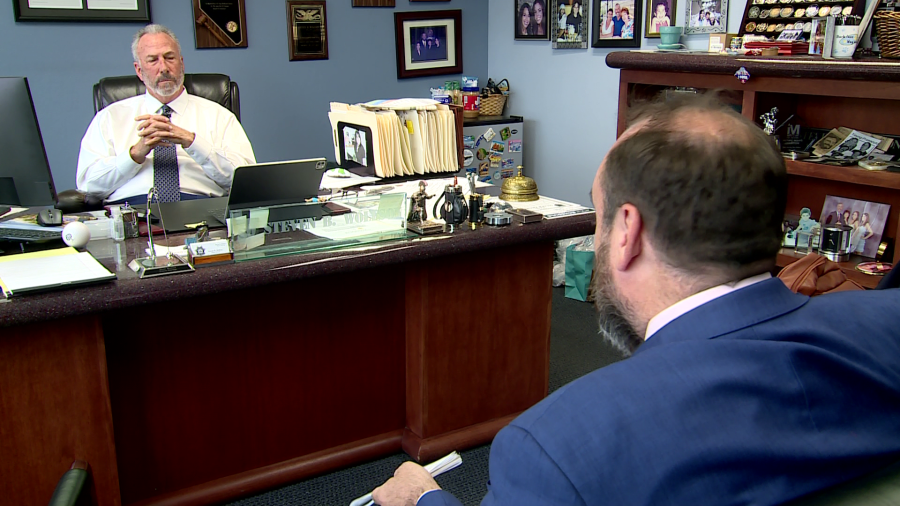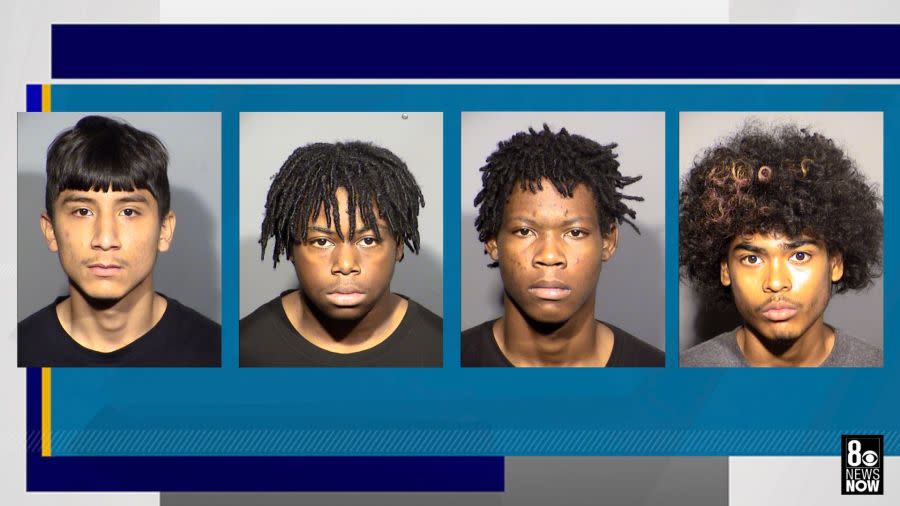How young is too young? DA seeks to charge 13-year-old as adult for murder in Las Vegas student beating

LAS VEGAS (KLAS) – As the Clark County District Attorney endeavors to charge four young teenagers for murder in District Court as adults for the severe beating of a Rancho High School student, the prosecution of the youngest defendant – a 13-year-old – raises questions about how young is too young.
“I don’t disagree that it’s not an easy thing to understand how a 13-year-old could commit murder,” the District Attorney, Steve Wolfson, said. “But I don’t want to exclude it from being possible.”
Wolfson said he will gauge each defendant’s – identified by Nevada statute as ‘offenders’ in juvenile court – role in the November 1 beating of Jonathan Lewis, 17, as he prepares his case against them.

911 call details aftermath of attack on Jonathan Lewis near Rancho High School
“It depends on the facts and circumstances,” Wolfson told the 8 News Now Investigators after all eight men appeared in court for the first time. “A lot of it depends on the attitude of that individual. Were they a follower of others? Were they a leader? How much of their behavior contributed to the ultimate demise of this young man?”
In court Thursday, attorneys for the four older defendants tried to distance their clients from the vicious beating, even laying the groundwork for a possible self-defense strategy.
“My client saw a knife,” one of those defense attorneys, Robert Draskovich, said in juvenile court.
But prosecuting a 13-year-old as an adult is rare, statistics obtained by the 8 News Now Investigators reveal. Since 2018, Wolfson’s office has only prosecuted one 13-year-old and four 14-year-olds as an adult. By comparison, and by state statute, 16- and 17-year-olds charged with murder are considered adults, and since 2018 Wolfson’s office has charged 180 and 278 of them with various charges, respectively.

“I think there are some 13-year-olds that are more mature and more advanced than others,” Wolfson said.
While no one is disputing that point, the scientific literature is clear that the human brain develops well into a person’s twenties. For example, the factsheet from the National Institute of Mental Health said that while brain size does stop growing during early adolescence, brain function does not.
“The part of the brain behind the forehead called the prefrontal cortex, is one of the last parts to mature,” the factsheet said. “This area is responsible for skills like planning, prioritizing, and making good decisions.”
It’s those decisions that UNLV’s assistant vice president of mental health Dr. Michelle Paul said 13-year-olds cannot make with the same clarity as adults.
“You haven’t lived enough life to even know what potential consequences are,” Paul, a Ph.D., said, speaking in general terms and not about any particular case or person.
Paul continued, boiling down the question that arises in situations like this murder case: “Is the adolescent developmentally mature enough to be held fully legally culpable and responsible for their actions equivalent to a fully mature adult.”
The Nevada legislature, in its most recent sessions and previous sessions, considered eliminating judicial discretion on whether to certify 13-to-15-year-olds that commit murder and keep them in the juvenile system, where the consequences of being held responsible are six to nine months and then up to three years of home confinement.
“Some of them haven’t gone through puberty,” State Sen. Rochelle Nguyen said about teens in that age group, questioning prosecutors in a hearing surrounding Assembly Bill 408, which sputtered and was ultimately not passed into law.
At that hearing in Carson City in February, Brigid Duffy, the head of Wolfson’s juvenile division, argued that prosecutors should at least have the option to argue that a 13-year-old should face adult consequences for murder.
“Because when we look at the world we’re living in today, I can imagine now, sadly, a world where a 13-year-old takes a firearm to a mall and kills other children,” Duffy testified in February.
Duffy told the 8 News Now Investigators she wants the criminal justice system to handle teenagers appropriately.
“My continued push and advocacy goes toward Nevada creating a blended sentencing model that has age-appropriate services in a secured environment,” Duffy wrote in an email.
The current certification process, which allows a juvenile court judge or hearing master to determine a number of factors – including prior juvenile delinquent history and treatment – also offers those offenders cover under the United States Constitution.
“There are due process protections in place for our most violent offenders because certification requires court determination,” Duffy wrote.
For the latest news, weather, sports, and streaming video, head to KLAS.

